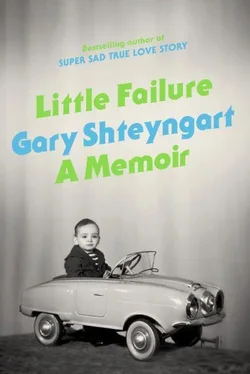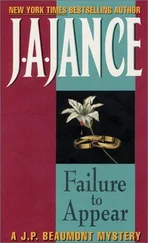My father seems depressed and aggrieved, more so than usual. Today I know that I am not the full source of his unhappiness. My father is very proud of his physique and, conversely, critical of mine, but on this Thanksgiving he does not look as rod thin and athletic as usual. He is gray-bearded and small, not fat by any means, bearing as much weight as a seventy-three-year-old man who is not a Burmese peasant should bear. Earlier, the father of my cousin Victoria’s husband, one of the few Americans that have thankfully diluted the all-Russian cast of my family, had poked him in the stomach saying, “You storing food away for the winter, Semyon?” I knew my father would swallow that insult whole, then, in the space of two hours, metabolize it into rage (“I am still the big one!”), the rage and humor that are our chief inheritance.
The ethnic cable is on, advertisements for shady Brooklyn dentists and new Queens wedding halls struggling to pump out the joy. I feel my father’s stare needling my right shoulder. I can calculate his stare from almost any distance on earth.
“I’m not afraid of death,” he says apropos of nothing. “God is watching out for me.”
“Mmmm,” I low. A new Russian soap opera set in the Stalin era comes on, and I hope that it can move our conversation in a different direction. When we had just arrived in America, my father used to take me for long walks around leafy Kew Gardens, Queens, trying to teach me the history of Russian-Jewish relations through a series of vignettes he liked to call The Planet of the Yids . Whenever I sense him falling down the rabbit hole of depression, preceded by him acting out something violent or phallic (cue the cucumber), I like to move us back to the past, where neither one of us is guilty of anything.
“This is interesting,” I say of the show in my best American “Hey, let’s be friends” kind of voice. “What year was this filmed, do you think?”
“Don’t mention the names of my relatives in the book you’re writing,” my father says.
“I won’t.”
“Just don’t write like a self-hating Jew.”
Loud laughter from the dining room: my mother and her sister in their natural mirth. Unlike my father, an only child, Mama and Aunt Tanya come from a relatively large family of three daughters. Tanya can be overly sweet and has a strangely American conviction that she is somehow special, but at least she does not come across as depressed. My mother has the best social skills of the bunch, always knowing when to bring people into her orbit and when to push them aside. Had she been born in the American South in the proper era, I think she would have done well.
“Da, poshyol on na khui!” Tanya, the youngest, is shouting over the din of the television. Well, let him go to the dick! And my mother is laughing a naughty middle child’s laugh, so happy that her sister is here in America and she has someone to say khui and yob and blyad with. Their seven-year separation — Tanya was allowed to emigrate from Russia only after Gorbachev took power — was unbearable for my mother. And because I spent my youth as a kind of tuning fork for my parents’ fears, disappointments, and alienation, unbearable for me as well.
“I don’t have any friends,” my father says in response to the laughter from the dining room. “Your mother doesn’t allow them here.” The first part is certainly true. I am curious about the second.
“Why not?” I ask.
He doesn’t answer. He sighs. He sighs so much I think he inadvertently practices his own form of Kabbalistic meditation. “Well, God be with her.”
Lying next to my father is a VHS tape entitled Immigration: Threatening the Bonds of Our Union: Part II: Treachery and Treason in America , produced by an outfit called American Patrol in Sherman Oaks, California. (Why does the extreme right wing like colons so much?) I’m wondering what the trigger-happy members of the American Patrol would make of my father, a Social Security — collecting Osama bin Laden — looking Semite sitting on a couch in an ethnic Queens neighborhood, his dining room stinking of immigrant fish, his house flanked by a Korean family on one side, an Indian clan on another.
“We are living different lives,” my father says, astutely. “And it makes me sad.”
It makes me sad, too. But what can be done? I used to be more forthcoming with my father, and, consequently, I used to hate him. Now I know just how much pain I can inflict, and do inflict, with each book I publish that does not extol the State of Israel, with each National Public Radio pronouncement that does not bind me in covenant with his famous God. Would it kill me, I think, to tell him right now: You are still the big one, Papa ?
I am the small one, forever, and you are the big one .
Would that make it right between us? There he was at the dinner table before his depression set in, still high on family feeling and a little bit of vodka, rushing over to serve me first, ladling in the mushroom soup, extra heavy on the onions, that he makes special for me. “Sour cream?” he asks me. “Yes, please.” “Bread? Vodka? Cucumber?” Yes, yes, and yes, Papa. The rest of the table might as well not exist for him.
“He loves you so much,” a girlfriend I brought to the family table once told me, “but he doesn’t know how to express it. Everything he does and says comes out wrong.”
I want to stay with him and make him feel better. I want to finish watching the Russian show on TV. Finish off the cucumbers and the soup choked with the mushrooms he has picked himself in a dense upstate forest. “Forty dollars each mushroom would cost in the store!” my mother is yelling at my cousin who is failing to partake of the dense fungus. “And still he won’t eat it!”
I want to have a family. I want to laugh, and also be awed by Aunt Tanya’s postmodern let’s-get-it-over-with-and-really-start-drinking Thanksgiving toast: “God bless America whatever .”
I want to be there when my mother, usually so in control, has cut herself three times in the course of preparing her “French.” Are her hands shaking? Is her eyesight failing? She looks so tired today. Will she recover in time for the manic burst of cleaning and worrying that will accompany her into the night? Is God watching out for us?
I want to close my eyes and feel a part of the cornucopia of insanity swirling around the table, because that insanity has alighted on my shoulders as well.

But I also want to go home. To Manhattan. To the carefully constructed, utterly inoffensive apartment that I have wrought to show in part that the past is not the future, that I am my own man. This is the creed I have made for myself: Day Zero. A new start. Keep the rage in check. Try to decouple the rage from the humor. Laugh at things that are not sourced from pain. You are not them. He is not you. And each day, with or without my parents’ presence, my creed proves to be bullshit.
The past is haunting us. In Queens, in Manhattan, it is shadowing us, punching us in the stomach. I am small, and my father is big. But the Past — it is the biggest.

Let’s start with my surname: Shteyngart. A German name whose insane Sovietized spelling, eye-watering bunching of consonants (just one i between the h and t and you got some pretty nice “Shit” there), and overall unattractiveness has cost me a lot of human warmth. “Mr., uh, I can’t pronounce this … Shit … Shit … Shitfart ?” the sweet Alabama girl at reception giggles. “Is, uh, a single bed okay for you?”
Читать дальше













